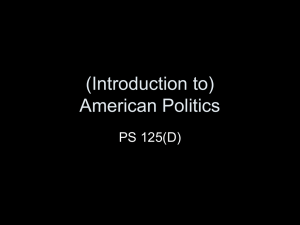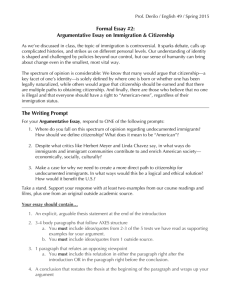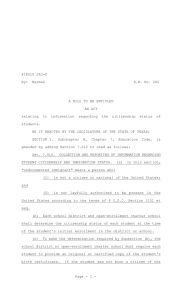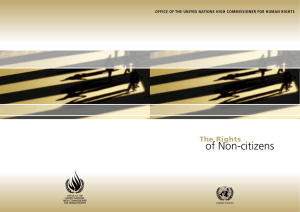Prepared Statement of The Honorable David S. C. Chu
advertisement
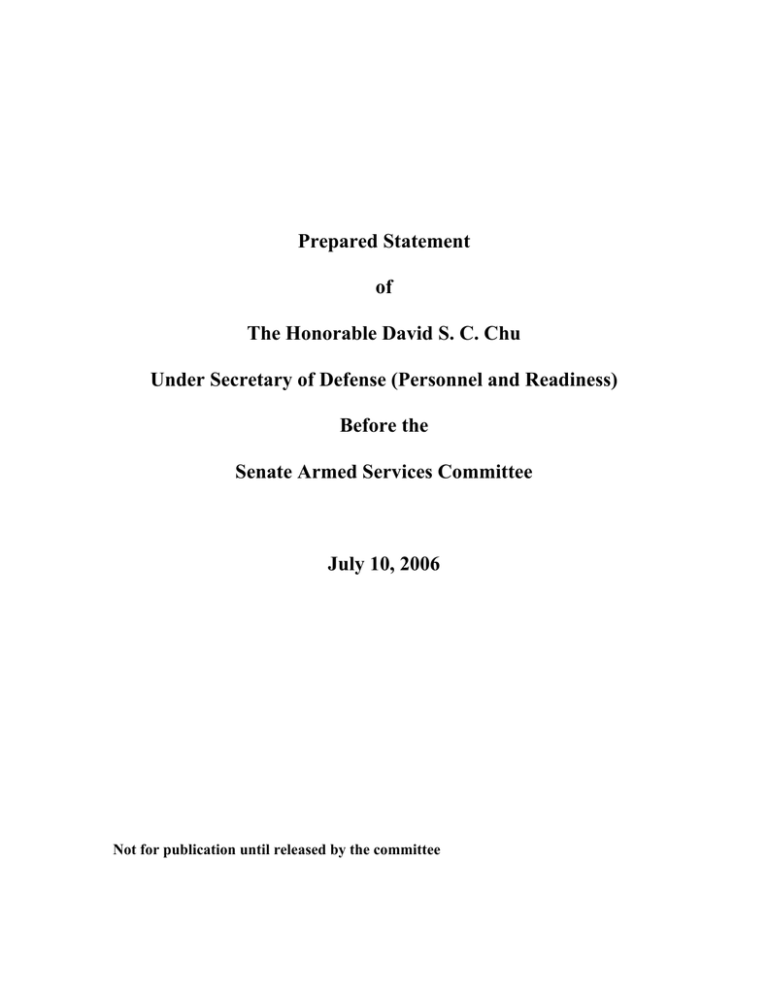
Prepared Statement of The Honorable David S. C. Chu Under Secretary of Defense (Personnel and Readiness) Before the Senate Armed Services Committee July 10, 2006 Not for publication until released by the committee Mr. Chairman, distinguished members of the Committee, I am pleased to be here today to discuss the role of immigrants in our Armed Forces. Our great nation -- a nation of immigrants -- has a long and distinguished history of the valor and sacrifices made by those who call the United States home, but are not yet citizens. I want to focus my remarks today on two areas surrounding immigrants in the Armed Forces. First, I want to talk about the contributions non-citizens are making in today's military. Second, I want to discuss future issues regarding the enlistment of non-citizens. Since the Revolutionary War, certain non-citizens have been eligible to enlist in the military. Non-citizens have served in the U.S. armed forces for much of our country's history, including the War of 1812, the Civil War, and both World Wars. Almost half of Army enlistees in the 1840s were immigrants (non-citizens), and more than 660,000 military veterans became citizens through naturalization between 1862 and 2000. The Lodge Act of 1950 (and subsequent Acts in 1951, 1955, and 1957), for example, permitted non-citizen Eastern Europeans to enlist between 1950 and 1959. Another example is the Navy's recruitment of Filipino nationals. The United States officially began recruiting Filipino nationals into the U.S. Navy in the late 1940s, when it signed the Military Bases Agreement of 1947 allowing U.S. military bases in the Philippines. Changes in the agreement and policy capped the number of Filipino enlistments at 1,000 in 1952, 2,000 in 1954, and 400 from 1973 on. Navy policy restricted Filipinos to the steward and mess attendant ratings from WWII until 1973. 1 In total, over 35,000 Filipinos enlisted in the Navy through the program between 1952 and 1991. The Navy stopped recruiting Filipino nationals and closed its recruiting facilities in the region in 1992 because of the end of the Military Bases Agreement, base closures, and force reduction measures. Prior to the National Defense Authorization Act for Fiscal Year 2006, Title 10, United States Code, Sections 3253 and 8253, stated that to be eligible for enlistment in the Army or Air Force in time of peace, an individual must be an American citizen or lawfully admitted to the United States for permanent residence – that is, possess the so-called Green Card. While there was no equivalent statute limiting enlistment in the Navy and Marine Corps, the same citizenship requirements were applied to those Services as a matter of policy. The National Defense Authorization Act for Fiscal Year 2006 repealed the Army and Air Force specific sections of Title 10, and established a uniform citizenship or residency requirement for enlistment in the Armed Forces of the United States in Section 504 of Title 10. Enlistment is now authorized for: • A national of the United States • An alien who is lawfully admitted for permanent residence (green card) • A person enlisting in the military under one the following compacts: o The Compact of Free Association between the Federated States of Micronesia and the United States 2 o The Compact of Free Association between the Republic of the Marshall Islands and the United States o The Compact of Free Association between Palau and the United States Notably, that amendment to section 504 also establishes that “…the Secretary concerned may authorize the enlistment of a person [other than one listed above] if the Secretary determines that such enlistment is vital to the national interest.” Since September 11, 2001, there have been several policy changes complementary to both the current and pending legislation that may encourage more non-citizens to consider military service. For example, today's service members are eligible for expedited citizenship, and the military services have worked with U.S. Citizenship and Immigration Services (USCIS) to streamline the citizenship application process for service members. In fact, we find that many service members attain their citizenship while serving. President Bush's executive order allowing non-citizens to apply for citizenship after only one day of active-duty military service is still in effect. Further, the National Defense Authorization Act for Fiscal Year 2004 (NDAA) permanently modified Section 328 of the Immigration and Nationality Act, reducing the peacetime waiting period before application for citizenship from 3 years to 1 year of honorable active-duty service. Under current DoD policy, applicants may be granted emergency leave and priority on government transportation if needed to complete citizenship processing. The military also has initiated several new programs, including 3 opportunities for those with language skills, which may hold particular appeal for noncitizens. In addition, the 2004 NDAA eliminated all application fees for non-citizens in the military and allowed for the completion of citizenship applications to be extended to U.S. consulates, embassies, and overseas U.S. military installations effective October 1, 2004. Previously, service personnel were urged to delay their applications until they were stateside, to avoid missed appointments with immigration officials or missed mailings. Today, more than 40,000 non-citizens serve in the military (active and reserve) and about 8,000 permanent resident aliens enlist for active duty every year. They serve world-wide in all Services and in a variety of jobs. They represent the United States both at home and abroad – even on the front lines in the Global War on Terrorism. Over 25,000 have earned citizenship while serving, and over 100 have made the ultimate sacrifice in war and have given their lives for this nation since September 11, 2001. As you can see, non-citizens are a vital part of our country's military. Those who serve are patriotic, with over 80 percent completing their initial enlistment obligation, compared with 70 percent for citizens. Non-citizen recruits continue to provide the Services with a richly diverse force in terms of race/ethnicity, language, and culture. Section 1059 of the NDAA for 2006 also provided for up to 50 “Special Immigrant Translators” per year – a category afforded special treatment to recognize their sacrifices 4 for National Defense in Iraq and Afghanistan – to be granted lawful permanent resident status, along with their families. DOD and USCIS are currently implementing this provision. According to an April 2006 study from the National Immigration Law Center, there are an estimated 50,000 to 65,000 undocumented alien young adults who entered the U.S. at an early age and graduate from high school each year, many of whom are bright, energetic and potentially interested in military service. They include many who have participated in high school Junior ROTC programs. Under current law, these young people are not eligible to enlist in the military, until and unless the Armed Services determine that it is vital to the national interest as provided by section 504. If their parents are undocumented or in immigration limbo, most of these young people have no mechanism to obtain legal residency even if they have lived most of their lives here. Yet many of these young people may wish to join the military, and have the attributes needed – education, aptitude, fitness, and moral qualifications. In fact, many are High School Diploma Graduates, and may have fluent language skills -- both in English and their native language. Provisions of S. 2611, such as the DREAM Act, would provide these young people the opportunity of serving the United States in uniform. 5 In his May 15, 2006 speech setting forth his view on immigration reform, President Bush underscored the fact that certain illegal immigrants with long-established roots in America should have an opportunity to pursue citizenship: “I believe that illegal immigrants who have roots in our country and want to stay should have to pay a meaningful penalty for breaking the law, to pay their taxes, to learn English, and to work in a job for a number of years. People who meet these conditions should be able to apply for citizenship, but approval would not be automatic, and they will have to wait in line behind those who played by the rules and followed the law. What I've just described is not amnesty, it is a way for those who have broken the law to pay their debt to society, and demonstrate the character that makes a good citizen.” - President Bush, May 15, 2006 Thank you, this concludes my statement. I would be happy to answer any questions from the Committee Members. 6
